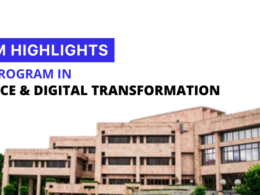With an aim to continuously help Data Science enthusiasts, Manav is sharing insights based on his experiences, in this second part of the interview. This will help you jump over the walls of doubts and tread the road to success. In case, you have something to share or ask, do not hesitate; Manav is all ears. Drop-in your comments, queries, doubts in the comment box.
You can read the first part of the interview here!
Ankita: Now that you have talked about how are Accredian programs unique, we move to the top two players of Accredian- the GCD and the GCDAI programs. What are the prerequisites for the students who want to enroll in these programs? Any pre-reads etc, so that they can make the most out of them?
Manav: One of the distinctive features of the Accredian Data Science programs is that these are tiered programs.
![]() For instance, you’re not ready to do AI right now. So, you can start with GCD and later move to AI. This is unique in the sense that most of the programs force fit you to go for one particular area and don’t give you the liberty to modify it as per the situation.
For instance, you’re not ready to do AI right now. So, you can start with GCD and later move to AI. This is unique in the sense that most of the programs force fit you to go for one particular area and don’t give you the liberty to modify it as per the situation.
Now, a prerequisite for GCD program is that you should have some bit of programming knowledge and some understanding of maths.
We go to the next level by giving the students Accredian starter kit, right before the program starts. This helps non-programmers, who want to enter the GCD program; they just need to go through the starter kit to get ready for the program.
This is done to ensure that all the students sitting in a particular class are starting on the same level. So that’s the extra extent to which we go to make the students ready for our programs.
Beyond this, there are no special prerequisites.
Just have that fascination for learning, hunger to stay ahead of the technology trends and essentially, the excitement to learn something new.
These are the prerequisites to learn anything. In the end, whether it is data science or anything else, what’s required the most is motivation; if you’re motivated, this is not rocket science; it can be easily done.
Ankita: Picking up my next question from what you said right now that the main prerequisite for GCD is having an experience in programming. So what is in store for the non-programmers? What is your advice for them? Can they enroll in these programs and how should they go about it?
Manav: This is a very frequent question that is asked by the people coming from a non-programming background; whether I can enroll myself in GCD? whether I can learn data science in the first place?
My answer is… The question you need to ask yourself is not whether I can do programming or not; that’s not important.
What you need to ask yourself is whether I want to learn Data Science or not. That’s the more important question.
Picture this- You want to climb Mount Everest. The first question you need to ask is- why do I want to climb Mount Everest? If you are clear about this, the rest of the things will fall in place. Whether you’re ready or not, is a secondary point.
The same principle applies to the folks from a non-programming background. Things will be a little bit of a challenge for you and you need to possibly put 1.5 to 2 times the effort that a programmer would put.
But if you know why you’re putting that additional effort, and how will that help you, moving ahead will not be a task; it will feel like I am putting my effort because I need to learn Python, which is required for data science; I cannot skip that.
So that’s something that I highly recommend to non-programmers.
Take a little difficult path in the beginning; once you have taken that path data science is not difficult.
As our part to make data science easier for the non-programmers, we teach students Python in the GCD program, which is easy to learn. It’s almost like broken English; but this doesn’t mean that you don’t need to put effort; it’s just that learning Python is comparatively easier.
Ankita: Manav, you said that focusing on the aim is important for the data science enthusiasts; whether programmer or non-programmer. Moving a little forward in that direction, what are the specific hours that a student should devote for their studies; whether it is the course material provided by Accredian, their self-studies, or the blogs or articles they are reading to keep up with the latest trends in the industry? What about the time they should devote to making case studies and working on use cases and projects?
Manav: That’s an excellent question because almost everyone in our programs are working professionals.
Now, there are two things that the working professionals face challenges with; one is balancing their studies along with their family and work.
Second is maintaining a consistent study pattern during the entire program. Both of these things are very important because we need to realize that there is never ever going to be a perfect time to learn anything, once we are in a full-time job.
This is the perfect time!
What working professionals end up doing is that they join the program, then they have some project and put Accredian program on the back burner. Suddenly they are free and start all over it again.
Avoid the start and stop approach and have a consistent attitude.
I would recommend that if you’re putting in 1-2 hours per day on weekdays and 3-4 hours on weekends, that’s more than enough; you don’t need to spend ten hours per day.
You should maintain this flow for the whole duration that you have kept aside to master data science. This way, you’re sure to get results.
Now, in terms of the breakdown of the time you should spend in data science, I would say that 50-60% of your efforts should go in practicing what you’re being taught in the program; doing what has been done by the faculty in the class, replicating that on your own; doing the assignments and quizzes.
20% of your time should be spent in doing projects; at a particular time, if you have been given one project, why don’t you take another project and work on it?
The remaining 20% of your time should go in reading articles about data science. This is an expansive field.
For students, who are getting started in this field, I would recommend that the more you read, the more you get to know about this field. So that’s how I would recommend time distribution for the students.
Ankita: A student’s journey en route to becoming a data scientist starts with him getting firm on his decision to go into this field, getting enrolled for these courses, attending the classes and then going on with the studies. What according to you is the best learning path for an aspiring data scientist so that the journey becomes easy?
Manav: The first thing towards the best learning path is not to do too many things at a time. This is what I firmly believe in.
Start with one thing, do it really well and then move to the next thing.
For instance, start with data analysis, for the first two months then focus on Python and statistics basics and then learn how to export data really well.
Once you have done all of this for two months, then you should move to machine learning concepts; get acquainted, inside out and focus on the algorithms. While you’re learning algorithms, try to implement these algorithms in real-world projects.
Trust me, if you’re doing this, you are ready to take up data science roles.
![]() The learning path that I would recommend is to go slow and steady; do one thing at a time, but do it really well. There’s no point in learning 100 different things superficially; try to have an in-depth knowledge of everything that you learn.
The learning path that I would recommend is to go slow and steady; do one thing at a time, but do it really well. There’s no point in learning 100 different things superficially; try to have an in-depth knowledge of everything that you learn.
Ankita: My last question to you would be about gaining the practical industry experience. Once a student has started his studies, is doing projects and is right into this field, how will he gain the REAL knowledge about the processes in the data science industry? How can they go about gaining this practical industry experience?
Manav: That’s an extremely important question because today recruiters are looking for professionals who have not only done some XYZ certification but can build things and solve real world data science problems.
When searching for a data science job, what is important from a professional point is not a certification that you have done but whether you can demonstrate that you can solve a problem; demonstrate word is important. How do you demonstrate that?
You demonstrate that by working on a lot of projects. This is how a recruiter will trust you that you have actually done data science.
![]() There are a lot of amazing datasets. Pick up datasets of your interest and explore them. Build machine learning models, do predictions and publish your analysis on GitHub.
There are a lot of amazing datasets. Pick up datasets of your interest and explore them. Build machine learning models, do predictions and publish your analysis on GitHub.
Done with all these important tasks? Now you have a solid rapport of projects in GitHub itself that will speak for you. The recruiter will also have some tangible points to interview you on.
GitHub projects are something that I would highly recommend people to work on.
Ankita: Manav, that was an extremely insightful conversation. I am sure that the students who go through this conversation will definitely have a clear vision to realize their aim. Thanks a lot for your valuable time!!






1 comment